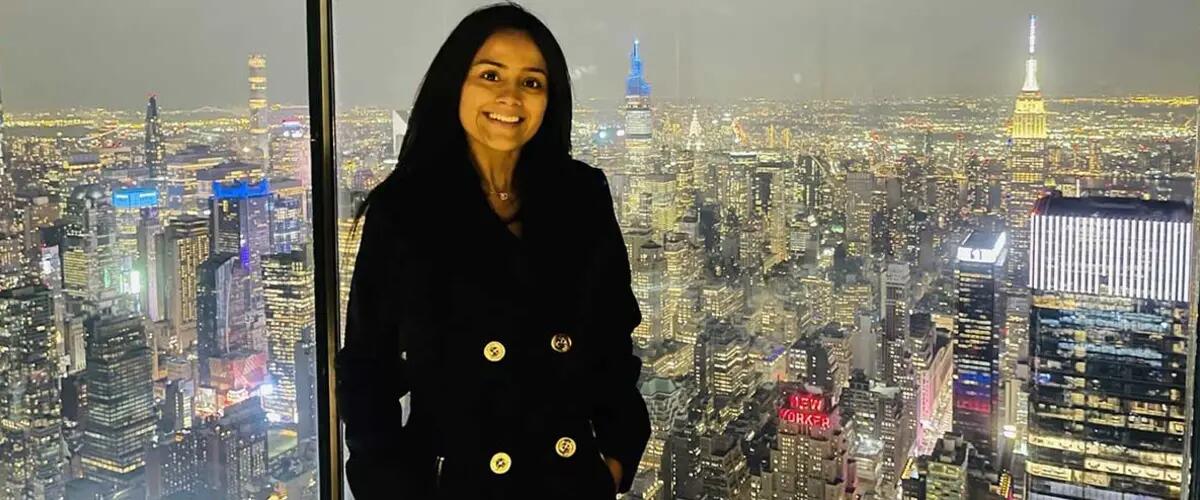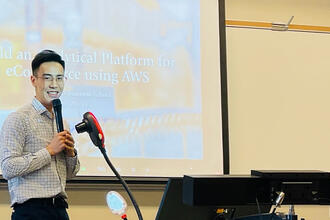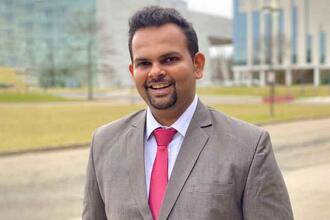
Alumna Shamali Shah
From India to Rutgers, alumna reflects on graduate student experience in the U.S.
Shamali Nitin Shah came from India to the United States for the first time to pursue a graduate degree at Rutgers Business School in Newark. The experience tested her, allowing her to grow as she immersed herself in a new culture and held on to her own. At the end of 2020, she graduated with a Master of Information Technology and Analytics. Now, she is employed as a data analyst with Slalom where she works with technologies such as Databricks, PowerBI, and Tableau.
With the clarity of hindsight, Shah looks back at her decision to attend Rutgers Business School, and how the experience prepared her for a new career.
Of everywhere you could have gone to attend graduate school, why did you decide to attend Rutgers Business School in New Jersey?
I conducted thorough research on universities across the U.S., looking specifically for programs with a strong mix of analytics, management as well as technology. Not many universities provided the electives related to analytics and management that I was looking for. As part of my research, I connected with alumni in my field, and reached out to professors, all of which guided my decision. In the end, the master’s degree in information technology and analytics at Rutgers offered the ideal blend of courses in data analytics, information technology, and project management.
What was it like to be a graduate student at Rutgers?
Initially, I was eager to explore the campus and build new connections, but as I settled in, balancing academics with social life became challenging. The rigorous coursework, coupled with the competitive environment, added to the pressure. However, despite the initial hurdles, I was able to adapt and, ultimately, thrive at Rutgers by building strong connections, applying for internships and full-time positions, and getting valuable support from the Rutgers Career Center.
What did you do to feel more comfortable so far from home and from the people you knew?
This was my first time coming to the U.S., and I did experience homesickness initially. To ease the transition and feel more comfortable, I took several steps. I connected with other students, both from India and other countries, who were going through similar experiences. I joined the MITSA student organization and participating in campus activities helped me to build a support network and make new friends. Regular video calls with my family and friends back home made the distance feel smaller. Working at the P3 Collaboratory at Rutgers provided valuable work experience and support, further easing my transition. Gradually, I felt more settled and comfortable in my new environment.
Where did you live while you studied at Rutgers Business School?
I lived in Harrison and truly appreciated the convenience of being within a 15-to-20-minute walk from campus. This made it easy for me to attend classes and engage in university activities. Additionally, the nearby amenities like cafes, grocery stores, and parks made life more enjoyable. The overall atmosphere struck a perfect balance between study and relaxation, helping me maintain a good rhythm during my time at Rutgers.
What did your capstone project require and what did you think of it?
The project involved developing a predictive model for stock prices in the airline industry during a period of significant market volatility caused by the COVID-19 pandemic. Specifically, we built a Long Short-Term Memory (LSTM) architecture model to forecast stock prices for major airlines like Delta, United, Alaska, and Southwest. We integrated text sentiment analysis on news articles to enhance our predictions. This project was particularly valuable for several reasons. First, working under the mentorship of Professor Sergei Schreider was a transformative experience. His support and expertise were crucial in helping us navigate the complexities of the project. Additionally, the project deepened my understanding of advanced analytical techniques and equipped me with practical skills in Python programming and financial forecasting. Overall, the combination of technical challenges, real-world relevance, and supportive mentorship made this capstone project a profoundly impactful and memorable experience. The knowledge I gained was also pivotal in helping me to succeed in interviews.
What was the most challenging aspect of the MITA program for you?
The most challenging aspect was mastering the advanced technical skills required, particularly in data analytics and programming. The coursework demanded a deep understanding of complex algorithms, statistical methods, and various programming languages like Python. It wasn't just about grasping the content but also about applying it effectively to solve real-world problems, often under tight deadlines. Balancing these technical demands with other responsibilities, such as my on-campus job and collaborative projects, added to the challenge. However, these difficulties pushed me to grow, sharpened my problem-solving skills, and ultimately allowing me to gain confidence in handling complex, data-driven tasks.
During the time you spent at Rutgers, did you visit other parts of New Jersey? What was your favorite place? What was the most interesting thing you've learned about New Jersey?
I made it a point to explore various parts of New Jersey. One of my favorite places was the Jersey Shore, particularly Asbury Park, with its vibrant boardwalk, stunning beaches, and lively atmosphere. It was a perfect getaway from the academic routine. I also enjoyed visiting Exchange Place in Jersey City. Whenever I needed a pick-me-up, I’d head there for a coffee and a peaceful view of the New York City skyline. Living close to NYC allowed me to visit the city monthly, which was always a highlight.
I frequently visited the Rutgers University New Brunswick campus, where I attended events and soaked in the energetic campus atmosphere. What I find most fascinating about New Jersey is its incredible diversity—a true melting pot of cultures, evident in its food, festivals, and communities.
Looking back, what did you gain by coming to Rutgers Business School? Why was it valuable?
It was immensely rewarding. The exceptional curriculum in Information Technology and Analytics equipped me with advanced technical and analytical skills, especially in data analysis, programming, and problem-solving. Projects like the capstone enabled me to apply these skills in practical scenarios, effectively preparing me for real-world industry challenges. Beyond academics, the diverse and collaborative environment at Rutgers was crucial in developing my communication and teamwork skills, which are essential in any professional setting. The relationships I formed with peers and faculty, including mentors like Professor Ehsan Teymourian, Professor Mehmet Turkoz, and Professor Ronak
Press: For all media inquiries see our Media Kit


